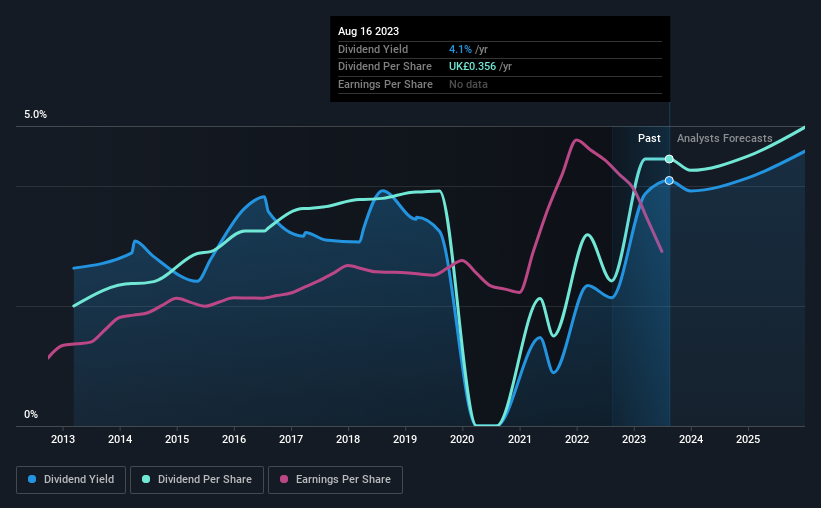Savills plc (LON:SVS) has announced that it will be increasing its periodic dividend on the 2nd of October to £0.069, which will be 4.5% higher than last year's comparable payment amount of £0.066. This takes the annual payment to 4.1% of the current stock price, which is about average for the industry.
See our latest analysis for Savills
Savills' Dividend Is Well Covered By Earnings
While it is always good to see a solid dividend yield, we should also consider whether the payment is feasible. Based on the last payment, Savills was paying only paying out a fraction of earnings, but the payment was a massive 379% of cash flows. The business might be trying to strike a balance between returning cash to shareholders and reinvesting back into the business, but this high of a payout ratio could definitely force the dividend to be cut if the company runs into a bit of a tough spot.
The next year is set to see EPS grow by 30.3%. If the dividend continues along recent trends, we estimate the payout ratio will be 46%, which is in the range that makes us comfortable with the sustainability of the dividend.

Dividend Volatility
While the company has been paying a dividend for a long time, it has cut the dividend at least once in the last 10 years. The annual payment during the last 10 years was £0.16 in 2013, and the most recent fiscal year payment was £0.356. This works out to be a compound annual growth rate (CAGR) of approximately 8.3% a year over that time. A reasonable rate of dividend growth is good to see, but we're wary that the dividend history is not as solid as we'd like, having been cut at least once.
Savills May Find It Hard To Grow The Dividend
With a relatively unstable dividend, it's even more important to evaluate if earnings per share is growing, which could point to a growing dividend in the future. Earnings per share has been crawling upwards at 2.6% per year. If Savills is struggling to find viable investments, it always has the option to increase its payout ratio to pay more to shareholders.
In Summary
Overall, we always like to see the dividend being raised, but we don't think Savills will make a great income stock. With cash flows lacking, it is difficult to see how the company can sustain a dividend payment. We would be a touch cautious of relying on this stock primarily for the dividend income.
Investors generally tend to favour companies with a consistent, stable dividend policy as opposed to those operating an irregular one. Meanwhile, despite the importance of dividend payments, they are not the only factors our readers should know when assessing a company. As an example, we've identified 2 warning signs for Savills that you should be aware of before investing. Looking for more high-yielding dividend ideas? Try our collection of strong dividend payers.
New: Manage All Your Stock Portfolios in One Place
We've created the ultimate portfolio companion for stock investors, and it's free.
• Connect an unlimited number of Portfolios and see your total in one currency
• Be alerted to new Warning Signs or Risks via email or mobile
• Track the Fair Value of your stocks
Have feedback on this article? Concerned about the content? Get in touch with us directly. Alternatively, email editorial-team (at) simplywallst.com.
This article by Simply Wall St is general in nature. We provide commentary based on historical data and analyst forecasts only using an unbiased methodology and our articles are not intended to be financial advice. It does not constitute a recommendation to buy or sell any stock, and does not take account of your objectives, or your financial situation. We aim to bring you long-term focused analysis driven by fundamental data. Note that our analysis may not factor in the latest price-sensitive company announcements or qualitative material. Simply Wall St has no position in any stocks mentioned.
About LSE:SVS
Savills
Engages in the provision of real estate services in the United Kingdom, Continental Europe, the Asia Pacific, Africa, North America, and the Middle East.
Excellent balance sheet, good value and pays a dividend.
Similar Companies
Market Insights
Community Narratives



